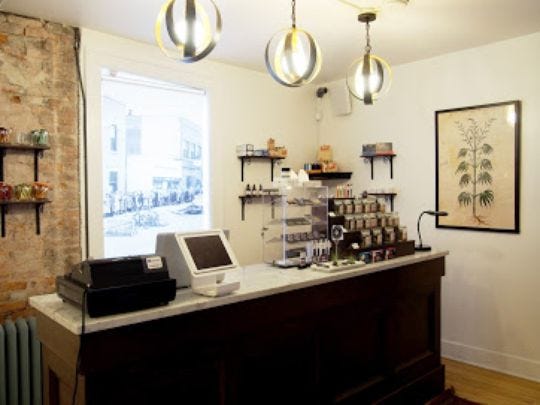Medical marijuana has been a thriving industry in Michigan for a decade
A week ago, Ohio's pharmacy board awarded 56 provisional licenses to operate medical marijuana dispensaries,
one of which will be in Fremont. While medical marijuana won't be available to consumers until September at the earliest, it's been a thriving industry in Michigan for a decade.
In 2008, Michigan voters passed a law legalizing medical marijuana. Since then, medical marijuana dispensaries have been springing up across the state. While there are similarities between Ohio's medical marijuana laws, signed by Gov. John Kasich in 2016, and Michigan's, there are also significant differences.
"The idea that Ohio is going to be very similar to Michigan could be completely wrong. They are two very different laws," said Al Moroz, manager of Arbors Wellness, a dispensary in Ann Arbor, Michigan. One of the biggest differences is that Ohio law does not allow patients to grow marijuana plants themselves, whereas Michigan allows patients to grow up to 12 plants.
Additionally, smoking medical marijuana is not allowed under Ohio law, but it is legal in Michigan. Michigan dispensaries are allowed to sell to out-of-state patients who have a state-issued identification card and a medical marijuana program registry card from the same state.
To obtain a card in Ohio, patients who already have a certified doctor's recommendation will have to submit a marijuana card application to the Ohio Department of Health Services.
No cards until September
The cards will be issued through the Board of Pharmacy starting in September. Until that time, even though medical marijuana is legal in both states, Ohio patients cannot buy cannabis in Michigan until they receive an Ohio registry card and are able to show it at Michigan dispensaries.
At this time, Ohio does not recognize medical marijuana registry cards issued in other states. There are 218,558 registered medical marijuana patients in Michigan and 38,107 registered caregivers who can buy or grow the marijuana for patients.
Ohio law is more lenient with the amount of cannabis patients can possess. Patients in Ohio can possess a 90-day supply of medical marijuana products. The permissible weight changes, depending on the product type.
Michigan patients are allowed to possess no more than 2.5 ounces of usable marijuana. The Michigan dispensaries offer a diverse array of marijuana products. Most dispensaries have a selection of cookies, brownies, gummies, THC-infused drinks, ointments, oils and creams, as well as ingestible, smokable products.
Ohio dispensaries might be similar, except they won't offer any smokable products. In Michigan, prices differ based on the product and place, but an ounce of medical marijuana buds generally costs between $200 and $300. A gram of the buds usually sells for between $10 and $20.
Cannabis culture
Each Michigan dispensary has its own cannabis culture and marketing strategy. Bloom City Club in Ann Arbor, for example, is the first and only Michigan dispensary owned and operated entirely by women. It grew out of the expertise of a founding member affectionately called "Ganjamama."
Bloom is trying to end the negative perception of cannabis by acting as an "ambassador" for ending cannabis prohibition and being compliant to Michigan rules and regulations.
Om of Medicine, another dispensary in Ann Arbor, has a bright, open environment filled with couches, coffee tables and musical instruments. The employees there are referred to as "oms," and host periodic comedy shows, jazz concerts and yoga classes.
Arbors Wellness, at 321 E. Liberty St., offers medical marijuana buds, edibles and concentrates that are all lab-tested so it can accurately inform patients about the potency of their medicine.
Arbors Wellness sells a variety of cannabis-based products, such as flowers, edibles, extracts, and more.
Moroz says Arbors Wellness values education so patients will be well-informed. He said that while their staff might not know every detail of the illnesses the patients are being treated for, they focus on informing patients of the best product for their situation. "We're a retail establishment. We're not a doctor's office," said Moroz. "We're not giving medical advice. We try to educate the patients on the products that we carry."
Moroz says that in order to find a specific treatment plan based on individual needs, they recommend patients try a few different products, all having low dosages. "It's a lot of trying to inform them how their body will react to different products, then seeing how their body reacts, and catering a treatment plan for them," said Moroz.
'We're treating symptoms'
Medical marijuana isn't always the solution to an illness, but it can help alleviate an illness' negative side effects. Arbors Wellness tries to find the right cannabis product for the specific issue a patient is having. "We're not curing anything, we're treating symptoms," said Moroz.
Although Ohio and Michigan are among the 29 states (plus the District of Columbia) that have legalized medical marijuana, the drug remains illegal under federal law. It is listed alongside heroin and LSD as a Schedule I illegal drug. "It's something that should be taken very seriously," said Moroz. "There are some major things to be aware of. If you cross the Ohio-Michigan border with marijuana you are breaking federal law."
Ohio planned to have dispensaries up and running by September, but that date has been pushed back to a time that has not been determined.
